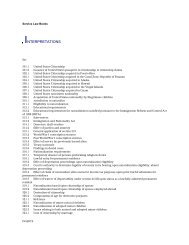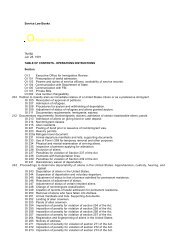Create successful ePaper yourself
Turn your PDF publications into a flip-book with our unique Google optimized e-Paper software.
<strong>Inspector's</strong> <strong>Field</strong> <strong>Manual</strong><br />
applicable.<br />
(d) Parole of crewmembers. Policies and procedures for parole of alien crewmembers are discussed in<br />
Chapter 23.12<br />
(e) Parole for deferred inspection. Procedures for parole of aliens whose inspection is deferred are discussed in<br />
Chapter 17.1<br />
(f) Special Interest paroles. Service informants and aliens entering as witnesses in criminal cases may be<br />
paroled only upon the authorization of the district director, chief patrol agent, or his specified delegate, based on<br />
a request by an assistant district director for Investigations. Parole in such instances is to be used only when an<br />
applicant is not admissible under any other provision of law. The entry and departure of such parolees must be<br />
carefully monitored. If a parole request originates from another Federal, State or local agency, it may be granted<br />
only when it is in writing, from the highest ranking official of the agency having jurisdiction over the area. The<br />
written request must contain a statement that the entry is required for official purposes, the expected duration<br />
and an explanation of how the parolee will be maintained while present in the U.S. Paroles at the request of the<br />
Drug Enforcement Agency (DEA) are considered separately in paragraph (g), below.<br />
(g) Paroles for DEA purposes. Requests for parole by the DEA generally involve large international drug<br />
trafficking investigations. Most defendants and witnesses in such cases are inadmissible to the U.S. for various<br />
reasons. In order to insure such requests are justifiable and necessary in support of the DEA mission, these<br />
requests are to be coordinated through DEA Headquarters. Immigration officers receiving such requests locally<br />
should advise Headquarters, Inspections Division.<br />
If a local DEA agent requests that a witness, defendant or informant be re-paroled, given advance parole or<br />
allowed to remain in the U.S. when out of status, first time requests may be granted locally by the district<br />
director for a period not to exceed 6 months. Subsequent requests for such cases should be routed through DEA<br />
Headquarters.<br />
(h) Reparoles. Whenever you change the purpose or duration of a parole, a new I-94 must be prepared and<br />
processed. Collect the original departure section and forward it for data entry with the new arrival section.<br />
Give the new departure section to the alien.<br />
16.2 Refugee Admissions.<br />
(a) Processing new refugee arrivals. Each year, the U.S. admits a set number of refugees as defined in section<br />
101(a)(42) of the Act, as prescribed by Congress and in accordance with section 207 of the Act. Screening and<br />
pre-processing of refugees is completed overseas, and those found qualified for admission will arrive, generally<br />
in large groups, at a few ports-of-entry. They will have a packet of materials, the contents of their "A" file and an<br />
I-94. Endorse the I-94 with the refugee admission stamp: "Admitted as a refugee for an indefinite period<br />
pursuant to section 207 of the Immigration and Nationality Act. If you depart the United States, you will need<br />
prior permission to return. Employment Authorized." Enter the port, date and your admission stamp number.<br />
Collect all file materials and route them to the local office where the alien will reside. Give the departure section<br />
of the I-94 to the alien and route the arrival section for data entry. If the alien has a travel document, stamp and<br />
endorse it in the same manner as the I-94, and write in the "A" number.<br />
(b) Returning refugees. In general, a refugee may temporarily depart the U.S. and reenter while in refugee<br />
status only if granted advance permission to do so. Permission is granted in one of two ways. A refugee may<br />
apply for and be granted an advance parole, Form I-512 or may apply for a Refugee Travel Document, Form<br />
I-571. Readmission of a refugee with an advance parole is handled as described in Chapter 16.1(b) above, if you<br />
are satisfied the alien is still eligible as a refugee. If an alien presents an I-571 clearly endorsed "Refugee" on the<br />
data page, inspect it for photo substitution or alteration. If you are satisfied that the refugee is still entitled to<br />
that status, endorse the I-571 with the refugee admission stamp, date, port and stamp number, and return the<br />
document to the alien, unless it is nearing expiration.<br />
Occasionally, you may encounter a returning refugee who departed the United States without any intention of<br />
abandoning status as a refugee, but who failed to obtain a refugee travel document or advance parole prior to<br />
his or her departure. Effective April 1, 1997, the regulations allow district directors the discretion to accept an




